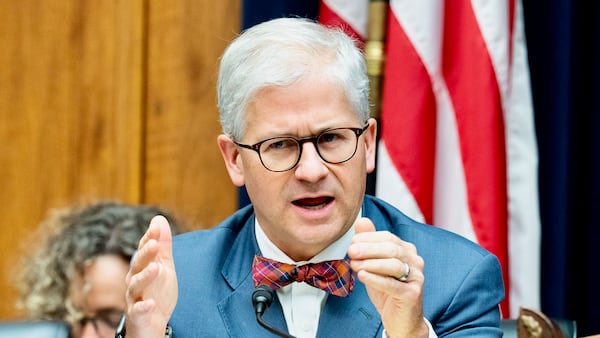- The cryptosphere waits to find out whether the SEC will approve BlackRock, WisdomTree and Fidelity’s applications to launch spot Bitcoin ETFs.
- The big guys moving into crypto could push out crypto-native firms.
- However, that is not something the CEO of CoinShares fears.
- This, and much more in this week’s edition of out The Guidance newsletter.
A version of this story appeared in our The Guidance newsletter. If you want to read this or our other newsletters before your friends do, don’t hesitate to sign up.
Hello! Joanna here with another edition of The Guidance, your guide to global crypto regulation.
This summer saw BlackRock file for permission to provide a spot Bitcoin exchange-traded fund in the US.
The Securities and Exchange Commission tends to approve these kinds of things in batches, so a bunch of other firms — including Invesco, WisdomTree and Fidelity — jumped in with their own filings soon after, hoping to be among the flurry of first approvals.
Still, there’s no guarantee the SEC will approve any of the applications: The regulator has shot down every request for spot Bitcoin ETFs for years.
But the news set off broader hopes (and fears) that established financial giants like BlackRock are poised to muscle in on this asset class.
DL News contributor Alex Daniel has been speaking with TradFi veterans at crypto investment firms about what these filings mean for smaller players in this space. And, well, it’s not all good.
”Who in their right mind would buy spot exposure to Bitcoin from a relatively unknown crypto-native provider if BlackRock has the same product at the same price?” Matteo Dante Perruccio, a former board member at British fund giant Jupiter Asset Management, told Alex.
Perrucio is now president of international at crypto asset manager Wave Digital Assets.
NOW READ: Tornado Cash founders agonised over KYC almost a year before sanctions, prosecutors say
As Alex writes, an optimistic take on the situation is that these firms with their millions of clients and asset management platforms can bring real inflows, ultimately growing the asset class for everyone.
For existing digital asset companies, however, this could also represent an existential threat.
How do you compete against firms that are super well resourced, used to working with Wall Street, and trusted by regulators and investors? BlackRock manages a staggering $9.4 trillion of the world’s wealth. Fidelity and Invesco are household names.
So smaller crypto-native firms are leaning in to what they see as their natural advantages — specialised knowledge of a relatively little-understood asset class and innovative agility.
NOW READ: R3 CEO says CBDCs are ‘not evil’ as Republicans clash in first primary debate
Alex writes that such firms might turn to staked exchange-traded products — instruments designed to deliver staking rewards to investors — for instance.
One of Europe’s largest and first crypto-native investment firms, CoinShares, already offers staked ETPs. It has also announced a pivot to active management at scale — another possible prerequisite for survival, according to Perruchio.
CoinShares CEO JM Mognetti told me recently that even the might of a firm like BlackRock can’t beat out the battle-tested strategies and specialised sales knowledge that firms like his have.
Crypto is their home turf; generalist sales teams even with the resources of BlackRock may find it difficult to compete.
CoinShares also has specialised research capabilities — a good thing for active management. Plus, the firm has a history of working with non-crypto-native investment firms like Invesco and Japanese investment bank Nomura, as well as regulators.
NOW READ: CoinShares CEO: We can beat the big firms on our own turf
These are the attributes that will bolster smaller firms against the competitive threats of the TradFi goliaths, he said.
You can read Alex’s article here.
On the subject of crypto exchange-traded products, our markets reporter Adam Morgan McCarthy writes that pending SEC approvals of the sale of futures contracts for ETH are good news for firms that want to roll out ETH futures ETFs.
”Ether futures ETF could also be a bright spot for DeFi investors who have been whipsawed this year by an endless stream of hacks and heists in the Ethereum-inspired precinct of the crypto world,” Adam writes. Adam’s full story is here.
I’m taking off for a couple weeks on vacation, but do please reach out to me with hot tips or your burning opinions on crypto reg — joanna@dlnews.com or Telegram @joannallama.
DL News also has a TG channel. Check out our News Feed for the latest breaking stories, community polls, and of course— the memes. https://t.me/dlnewsinfo

Coinbase-funded lawsuit against Tornado Cash sanctions was ‘nigh impossible to win’
When the US Treasury Department last year sanctioned Tornado Cash, the industry pushed back with lawsuits arguing that banning use of the mixer was a violation of free speech. Last week, one of those lawsuits failed. Aleks Gilbert wrote about why the case was unwinnable from the get-go.
Tweet of the week
🚨👀
— Bill Hughes : wchughes.eth 🦊 (@BillHughesDC) August 21, 2023
FCA sets out expectations for UK cryptoasset businesses complying with the Travel Rule
“From 1 September 2023, cryptoasset businesses in the UK will be required to collect, verify and share information about cryptoasset transfers, known as the ‘Travel Rule’.”…
Comment of the week
“This rulebook is a very good introduction to MiCA. It is not MiCA, nor is it trying to be, but I think it will serve as a unique transitional regime.” — Vlaho Hrdalo, attorney and president of the Blockchain and Cryptocurrency Association in Croatia.
Some EU nations are racing to apply the European Union’s Markets in Crypto-Assets Regulation, or MiCA, to their respective markets. Croatian financial regulators have adopted a rulebook directing crypto firms to register with officials in 60 days.



